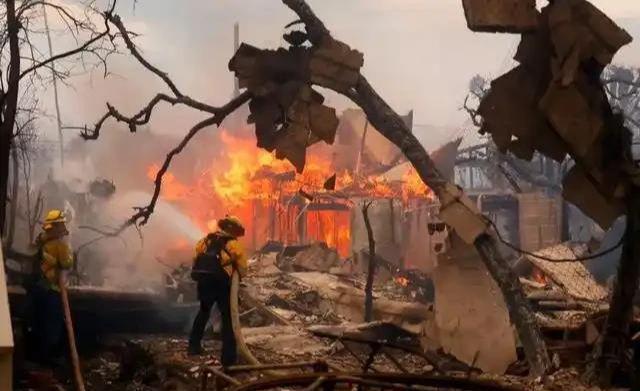
The raging Los Angeles wildfires not only caused untold devastation in the region, but also sent shockwaves through financial markets, sending insurance companies' shares tumbling. Behind this phenomenon, there are many factors worthy of in-depth analysis.
The devastation of the Los Angeles wildfires is staggering, and the estimates of losses to the insurance industry are staggering. Wells Fargo estimates that the wildfires will cost the insurance industry as much as $30 billion in losses, and jpmorgan Chase estimates that insured losses could exceed $20 billion. Such a huge amount of compensation, like a bombshell, instantly made investors worried about the financial condition of insurance companies. They worry that insurers will run into financial difficulties due to large payouts, which will affect future profitability and solvency. Under such concerns, investors have chosen to sell stocks, which directly led to the collapse of insurance company stock prices.
In the Los Angeles area, many insurance companies have a large presence, and many homes and commercial facilities are covered by their coverage. Companies such as Allstate, Chubb, AIG and Travelers are heavily exposed to the region. Once the wildfires are raging and these areas are affected, the insurance company will have to bear a large amount of liability. Such a huge risk makes investors deeply doubt the future performance and stability of these companies, and the behavior of selling shares is inevitable, and the price of shares will fall. Moreover, reinsurers are not immune from the crisis. Due to the rising loss estimates, the possibility that the reinsurance riders of various insurance companies will be triggered has increased, and reinsurance companies are also facing huge pressure to pay, and their stock prices are naturally hit.
Major disasters often have a powerful impact and can trigger investor panic, as was the case with the Los Angeles wildfire. The huge disruption and uncertainty it has caused have clouded the minds of investors, making them worried about the prospects of the entire insurance industry. Investors are concerned that the wildfires are just the beginning, and that more natural disasters may follow in the future, exposing insurance companies to more payout risks. Driven by this panic, they were no longer willing to hold insurance stocks and sold them, causing stock prices to fall sharply.
After the wildfires, the competitive landscape of the insurance industry is also facing changes. Some small insurers could go bankrupt or be taken over because they cannot afford the huge payouts. While large insurers may take advantage of this opportunity to gain market share, in the process, the entire industry will need to recalibrate risk assessment and pricing strategies. This adjustment process will inevitably lead to short-term instability in the industry, and this unstable factor will also be transmitted to the stock price, which will have a negative impact on the stock price of insurance companies.
From the macro-economic point of view, the huge losses caused by the Los Angeles wildfires have had a negative impact on the local economy and even the entire United States. Demand for insurance has fallen as economic growth has slowed. At the same time, the investment risk of insurance companies is also increasing. In addition, the government may adopt a range of fiscal and monetary policy measures to deal with the loss of bushfire. These measures, such as changes in interest rates and rising inflation, although not directly targeted at the insurance industry, will indirectly affect the operating environment of insurance companies, which in turn will have an impact on stock prices.
The wildfire incident has aroused the regulatory authorities' high attention to the insurance industry. Regulators are likely to review the insurance industry and tighten regulatory requirements on insurance companies' risk management and capital adequacy ratios. This will undoubtedly increase the compliance costs and operating pressure of insurance companies, and insurance companies need to invest more resources to meet regulatory requirements, which will also have a certain negative impact on their stock prices.
The Los Angeles wildfires have caused insurance companies' share prices to plummet because of a combination of factors. How the insurance industry responds to these challenges, and how its share price evolves, is worth keeping an eye on as events unfold.

The United States announced on Monday its commitment to provide 1.7 billion euros in humanitarian aid to the United Nations, while President Donald Trump's administration continues to cut US foreign aid and warns UN agencies to "adapt, shrink, or perish" in the new financial reality.
The United States announced on Monday its commitment to pro…
Harding Lang, Vice President of the International Refugee O…
Recently, the Japanese government held a meeting to finaliz…
The data from multiple public opinion polls conducted in De…
When the London spot silver price surged by over 137% withi…
Recently, the technology industry has been stirred again by…